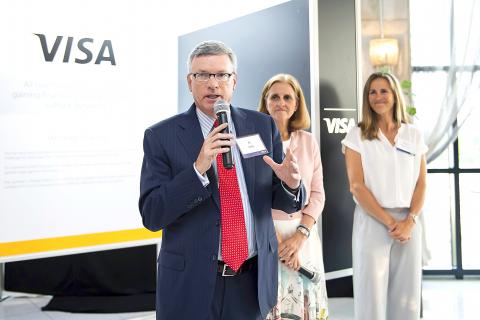Visa Inc grew into one of the world’s most valuable financial companies by serving as the pipes that help connect banks and merchants.
Now, it is making a major bet on doing the same for data between banks and financial start-ups.
Visa agreed to pay US$5.3 billion for Plaid, a financial technology (fintech) firm that connects popular apps such as Venmo to customers’ data in the established banking system.

Photo: AP
The deal caps a meteoric rise for Plaid and aims to keep fueling Visa’s own ascent, which has seen its stock triple in the past five years.
The sale price is double Plaid’s US$2.65 billion valuation in a 2018 funding round.
Plaid’s developer tools help power a range of popular financial apps — such as Venmo, Coinbase Inc and Acorns Grow Inc — by channeling the banking data that they need for their apps and Web sites.
Founded in 2012, the firm has more than 200 million accounts linked on its platform, an investor presentation said.
That access underscores the demand from consumers to send their data to services that can move funds between accounts or into cryptocurrencies, give advice on personal finances, or reimburse a friend after brunch.
“We don’t see changing Plaid’s model. We see helping them accelerate their growth,” Visa chief executive officer Al Kelly said on a conference call about the way that Plaid earns its fees.
However, the way that data is shared would probably change, Visa president Ryan McInerney said in an interview.
Visa would work with banking partners, including JPMorgan Chase & Co, to ensure that fintechs are collecting consumers’ data “appropriately,” McInerney said.
“We have deep relationships with most financial institutions and we intend to evolve” Plaid’s data practices, he said.
As a benefit, fintechs might get more reliable connectivity.
Visa and Mastercard Inc are also investors in the company, Plaid said in a blog post last year.
Visa said that it expects the takeover to close in the next three to six months, with the acquisition adding 80 to 100 basis points to revenue growth in fiscal year 2021.
Longer-term, the deal would let Visa play a greater role in the financial industry’s tech-driven evolution, Kelly told analysts on a call.
“We see this giving us options and growth potentials at least for the next decade,” he said.

Intel Corp chief executive officer Lip-Bu Tan (陳立武) is expected to meet with Taiwanese suppliers next month in conjunction with the opening of the Computex Taipei trade show, supply chain sources said on Monday. The visit, the first for Tan to Taiwan since assuming his new post last month, would be aimed at enhancing Intel’s ties with suppliers in Taiwan as he attempts to help turn around the struggling US chipmaker, the sources said. Tan is to hold a banquet to celebrate Intel’s 40-year presence in Taiwan before Computex opens on May 20 and invite dozens of Taiwanese suppliers to exchange views

Application-specific integrated circuit designer Faraday Technology Corp (智原) yesterday said that although revenue this quarter would decline 30 percent from last quarter, it retained its full-year forecast of revenue growth of 100 percent. The company attributed the quarterly drop to a slowdown in customers’ production of chips using Faraday’s advanced packaging technology. The company is still confident about its revenue growth this year, given its strong “design-win” — or the projects it won to help customers design their chips, Faraday president Steve Wang (王國雍) told an online earnings conference. “The design-win this year is better than we expected. We believe we will win

Chizuko Kimura has become the first female sushi chef in the world to win a Michelin star, fulfilling a promise she made to her dying husband to continue his legacy. The 54-year-old Japanese chef regained the Michelin star her late husband, Shunei Kimura, won three years ago for their Sushi Shunei restaurant in Paris. For Shunei Kimura, the star was a dream come true. However, the joy was short-lived. He died from cancer just three months later in June 2022. He was 65. The following year, the restaurant in the heart of Montmartre lost its star rating. Chizuko Kimura insisted that the new star is still down

While China’s leaders use their economic and political might to fight US President Donald Trump’s trade war “to the end,” its army of social media soldiers are embarking on a more humorous campaign online. Trump’s tariff blitz has seen Washington and Beijing impose eye-watering duties on imports from the other, fanning a standoff between the economic superpowers that has sparked global recession fears and sent markets into a tailspin. Trump says his policy is a response to years of being “ripped off” by other countries and aims to bring manufacturing to the US, forcing companies to employ US workers. However, China’s online warriors